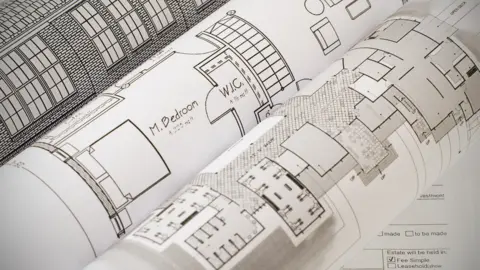NI planning system has low levels of public trust, research finds
 Riverlim
RiverlimThe public has a low opinion of Northern Ireland's planning system, according to research by academics at Queen's University.
They found poor levels of public trust.
This included concerns that councillors who now take many decisions were "too close" to developers.
The public also feel the transfer of planning powers to councils had led to slower decisions, less transparency and greater opportunity for corruption, according to the study.
It is the first significant piece of research into Northern Ireland's planning system since the transfer of decision-making powers to Northern Ireland's councils.
'Perceptions do matter'
One of the academics involved, Dr Linda Fox Rodgers, said the findings looked at people's perceptions and some might be "ill-founded".
But she added, even if they were, "perceptions do matter" and could prevent people engaging with the planning system to improve it.
She said what was needed was "greater openness and transparency", which could help "demystify the system".
Examples included better explanations when councillors overturned recommendations by planning officials and greater information on political donations.
More than 400 participants responded to the survey, including developers, planners, and local councillors.
The single biggest group was made up of interested citizens, who comprised a third of responses.
Of the respondents, 70% said they found that the planning system did not serve the public interest and many felt their views were rarely taken into account when planning decisions were being made.
Call for 'lobbying' register
Issues such as affordable housing, climate change, environmental protection and car dependency all needed to be addressed better in decisions that were taken, the survey found.
Asked for views on who had the most power in the planning system, the Planning Appeals Commission (PAC), which adjudicates on contested decisions, came out top.
After that, it was planners, councillors and developers, with ordinary citizens in last place.
Respondents called for a register of all lobbying on planning applications, the enforcement of codes of conduct for councillors on planning committees and better protection for whistleblowers.
The survey results build on work in 2011, which showed a lack of public confidence in the then centralised planning system and a desire for reform.
